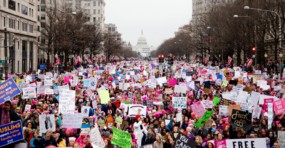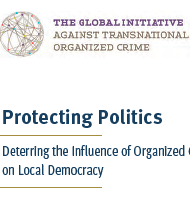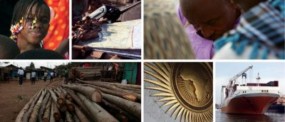Posted on 10 Nov 2016
Organised crime has always been connected to politics. Yet three recent popular democratic elections have proved that we insufficiently appreciate how the undertow of illicit markets and criminal activities have dramatically shattered a set of established pillars of the current world order, and the traditional tools of democracy, law enforcement and multilateralism are struggling to respond. While of course illicit economies are only part of a wider package of issues affecting current events, they nonetheless highlight a dovetailing of the licit and illicit that is under analysed and little understood.
The dramatic upset election of Donald Trump as president of the United States, but also the rise of the Philippines leader Duterte and the Brexit vote in the United Kingdom were each the expression of citizens alienated by the process of globalisation, afraid of its consequences for their safety and livelihoods, and anger at the establishment and elite who were perceived as having profited at their expense. In a way, in each of these countries, ordinary citizens were searching for new forms of security in an increasingly insecure world.
Popular resentment has been growing at the impact of organised crime and its connections to globalisation in many parts of the world. Trump campaigned on the conditions of the inner cities – these are without doubt tied to the nature of violence associated with drug markets; he campaigned on fear of ‘bad hombres’ – the criminals and rapists that come with cross-border crime.
Duterte’s drug wars were central to his campaign, and while his crude enticement of vigilante justice has horrified the liberal west, in a recent visit a Manila taxi driver put it into perspective: “You don’t understand you outsiders…. we are tired of what drugs are doing. I support the President”. That is in no way to justify the violence currently underway, but it speaks to the fact that ordinary people have become alienated from established and long accepted forms of governance because the darker side of globalisation has not been understood, accepted or successfully controlled.
In the case of the UK, Brexit was a repudiation of the vulnerability that comes with multilateral decision making. The fear that EU policies would dictate who would and could come to the UK was a fear expressed at the highest levels. Liam Fox, the former Defense Secretary stated “[We] have no idea whether these people are genuine refugees or asylum seekers, or economic migrants, or terrorists operating under the cover of either … [if Britain remains in the EU, these people] will have an absolute right to come to the UK – and we won’t know who they are either… they might be crossing the borders both to work, or coming to do us harm.”[1]
But there is a second dynamic at work. That not only had the deviant forces of globalisation made ordinary people more vulnerable, at the same time it had made the global elite more powerful. The discussion around organised crime seldom intersects with politics at this level. But it should. The international community and the liberal elite have responded to each of these upset electoral results with shock. But a better understanding of the shape and evolving (and oft misunderstood) nature of that underworld would have provided insight.
The advance of globalisation, as the Global Initiative has sought to document since its establishment, has forged not only stronger and highly inter-connected global ties, but also a dark underworld of illicit economic interactions. While the latter is not per se new, the extent and scope of its tentacles are, and its ability to launder not only its money, but also its kingpins and profiteers, through the traditional systems of business, high finance and politics have become increasingly brazen.
In short, in the majority of the world, in the eyes of the general populace, the establishment elite and the criminal have become synonymous. While lower classes go to prison, bankers receive bonuses. Elections are too easily bought, covertly or overtly, regardless of the source of funds.
Policy discussions on organised crime in the vaunted halls of power steer clear of this truth – it is too uncomfortable to discuss. But there is an intersection, as the Panama Papers amongst others showed, between the sinews of the licit and illicit global economies. That blurring has consequences: people in a remarkable diversity of countries perceive their leaders to be a distant and increasingly wealthy elite, they seldom trust them, do not perceive them to be speaking the truth, or assume that those who govern act in the best interests of their citizens. A conversation with ordinary people from Portland to Pretoria; Phnom Penh to Paris elicits a similar set of responses, with the word “criminal” not out of place in discussions of day to day politics.
In all of these cases, then, it is the big promises of a tough-talking, anti-establishment strong men that have resonance. Their promises to crack corruption, clampdown on crime and bolster policing and borders provide the illusion of security. But what we know from such experiments in other theatres, is that exclusively militarised response to organised crime and illicit markets are bound to fail – and will have long-term costs. The rhetoric and response in fact inflames the exact problems they were purported to address, making genuine peace, stability and progress recede still further.
Another recent popular vote could not have highlighted this disconnect more sharply. The Colombian governments arduous 5-year negotiation with the revolutionary insurgent group, the FARC, was meant to be a landmark end to a 50-year conflict, fuelled and funded largely by cocaine trafficking, that has taken more than 220,000 lives. Yet it was overturned by a nationwide referendum, who saw this as a cynical bid by the President to win a Nobel prize, and for drug-traffickers to legitimise themselves without any meaningful penalty. In fact, however, it was probably the best chance in generations for a peaceful resolution to the conflict and a delinking of the drug trade from conflict.
These shocking political changes are, thus, partly a response to our inability to curb powerful market forces that have shaped illicit movements, and the old and increasingly ineffective tools we employ without nuance.
Furthermore, when used in the context of politicised crime, law enforcement instruments and security institutions are weak at best, or at worst become violent agents of an equally aggressive state that prosecutes selectively to protect the establishment and denigrate threats or opposition.
At the international level, the multilateral norms and conventions designed to protect, are instead portrayed as hamstrung talk shops meant to impede and weaken national sovereignty and citizen security.
To illustrate: Just a few weeks before the momentous election in the United States, the Conference of Parties of the UN Convention against Transnational Organised Crime was held in Vienna. You would think given the subject matter and the linkage between “dark globalisation” and political mobilisation that it would have been a closely watched event. It was anything but. There was as far as we are aware no main stream media coverage at all. It is a sad reflection on the nature of multilateral attempts at responding to so-called asymmetrical challenges in the changing global order.
But in fact, there was nothing to report from the UN Conference on organised crime. There was little substantive discussion of organised crime. Instead, the week long agenda was dominated by talk around a review mechanism, a bureaucratic means to measure progress against the Convention which has been on the agenda since 2001 when the Convention was first signed.
What do these realities mean for organised crime itself – and also for the evolving struggle against it? That is hard to predict. But what the recent votes would suggest is that more and more states will look inwards, sealing up their borders and seeking to restrict the free flow of trade that has defined and shaped the globalised world order.
Globalisation is here to stay, and illicit markets and the underworld have run ahead of the legitimate economy in many ways. They will continue to be fuelled by advances in technology and logistics. Ironically, higher border fences will be a boon to organised crime, which has the skills and resources to subvert these barriers and the resources to corrupt.
Thus, illegal markets will not end. They will become more entrenched and in some places be characterised by more violence and human suffering. States in conflict or where governance is weak and compromised will remain at the centre of this vortex. And it is here that the impact of illicit flows and those that profit from them has remained underappreciated.
Greater conflict and instability will provide more, not less, opportunity for criminal markets and their transit zones – and greater challenges for those at national and international level tasked at designing peace interventions, or negotiating their conclusions.
Multilateral responses to state fragility, promoting genuine inclusive democracies, enshrining the rule of law and ensuring equitable development, hold the most likely prospect of making a difference if well-funded and executed. But these will be on the back foot in the face of popular movements to address domestic challenges first.
Local, national and global networks amongst like-minded actors are needed more than ever. However, organised crime, already strongly mingled with politics in many places, undermines multilateral diplomacy in an effort to protect their individual interests.
To overcome this stalemate will require greater understanding than ever of the linkages between the illicit and the sinews of local, regional and international political economy. Globalisation cannot be reversed, but it must be better understood, and it must be made more palatable: its advantages need to be more equally spread; we must show that we can control the excesses to which it has given rise, and we must prevent its most threatening manifestations. And it must be recognised that, more than ever, the fight against the illicit increasingly has direct ties to pressing environmental concerns and the requirement to build sustainable forms of livelihood.
This will require leadership, exemplary governance and extraordinary political will to build bridges and expand constructive alliances to counter these illicit networks and their intersection across multiple areas of political, economic, environmental and social development, rather than isolationists, jingoistic strong men stoking fear in loud voices through bullhorns. In the absence of such leadership, civil society and popular pressure will have to provide a competing diversity of voices. Achieving and protecting plurality, transparency and inclusion must be a priority for all development centric states. And to do otherwise is to fail in our duty to provide better life opportunities for all of the world’s citizens.
Mark Shaw and Tuesday Reitano are with the Global Initiative against Transnational Organized Crime.
[1] Tim Ross, “Terrorists could enter Britain among refugees,” The Telegraph, 30 January 2016



